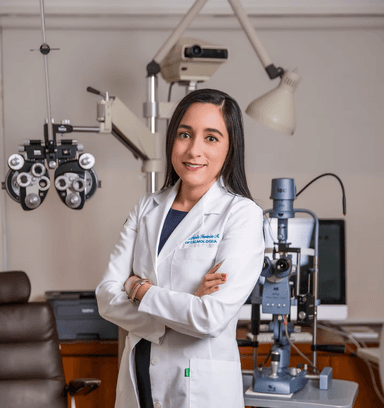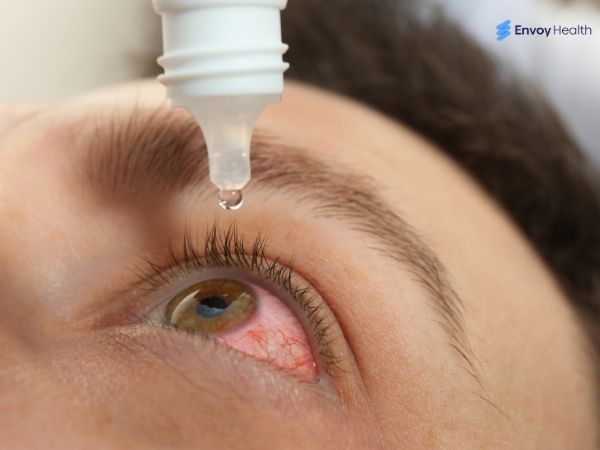What You Should Know About Blurry Vision After a Cataract Operation?

Prathyusha Itikarlapalli
- Content Writer

Dr. Natalia Hernandez Martinez
- Reviewed by

Table of contents
- What Are Cataracts and How Are They Treated?
- What to Expect Visually After Cataract Surgery?
- Common Causes of Cloudy Vision Post-Surgery
- Why Is My Vision Still Blurry Weeks After Surgery?
- Blurry Vision Timeline: When Symptoms Typically Show Up
- How to Fix Blurry Vision After Cataract Surgery?
- Medical Treatments for Post-Surgery Cloudy Vision
- Do Home Remedies Work for Post-Cataract Blurriness?
Key Takeaways
- Cloudy vision after cataract surgery is a common and normal part of the healing process. It resolves within the first few weeks as the sensitive eye tissues heal.
- Prolonged, persistent, hazy vision beyond a few months after cataract operation can be a sign of dry eyes, cystoid macular edema, secondary cataract, or more serious retinal detachment.
- Home remedies cannot fix the issue. Doctors plan the treatment based on the condition and severity of the problem. Artificial tears, anti-inflammatory eye drops, laser therapy, and NSAIDs can effectively treat the hazy vision after cataract removal. Prescription glasses provide clear vision for issues related to other refractive errors.
A Brief on Cataracts and Their Treatment
The biconvex, transparent eyelens lies between the iris and the pupil. Primarily, it focuses the light onto to retina, creating a clear image at different angles and distances. By nature, it's flexible and changes its shape based on the distance of the objects you see. So you have clear eyesight. However, in some candidates, the protein within the natural eyelens breaks down and accumulates over time. This causes hazy, blurred, or faded vision, which develops gradually over time. Initially, the eyesight may seem like looking through a dusty window, but eventually, it becomes so severe as to impact the quality of life significantly. Simple routine tasks, such as reading, driving, and recognizing faces, can be difficult. The WHO study states that nearly 19.3 million people suffered from cataract in the early 1990s, and today, nearly 100 million cataract eyes worldwide are seeking effective treatment.[1]
While cataracts are most common among the elderly, it's worth noting that genetic factors also cause cataracts in young people. While they significantly impact daily life, surgical removal of the clouded cataract is the only existing effective treatment approach. Ophthalmologists make incisions to gain access to the clouded cataract, break it down into pieces, and extract it. They place an artificial intraocular lens (IOL) in place that can restore normal vision. While some ophthalmologists adopt conventional surgical practices, laser cataract surgeries have also gained popularity.
How Is Vision After Cataract Surgery?
Removing a clouded lens and replacing an IOL offers a significant improvement in vision clarity. While this seems logical, the series of events that happen naturally may differ. Commonly, candidates experience clear eyesight within a few days after cataract surgery. However, some patients complain of seeing hazy vision after cataract surgery. So, if you ask us, is blurred vision after cataract surgery normal? Please note that this is normal and typically lasts for a few days or a week. But if you are concerned, “Why do I still have blurry vision after cataract surgery?”, we addressed this in the upcoming section.
What Causes Cloudy Vision After Cataract Surgery?
The general cloudy vision that occurs after cataract surgery is a normal part of the recovery process, resulting from inflammation and swelling of the eye tissues. Regardless of the surgical method, whether it follows the conventional approach or utilizes advanced lasers, the eye tissues undergo a certain amount of trauma. This causes the eye tissues to swell, affecting how light is focused on the retina. This causes some amount of haziness, which is completely normal. But if you are wondering, “How long blurry vision after cataract surgery?,”The answer is that this should subside over time, likely within a few days or a week. Your eyesight should improve as the eye heals and you train your eyes after cataract surgery.
Why Is My Vision Blurry After Cataract Surgery, Even After Weeks Have Passed?
While the blurriness due to less serious causes, such as tissue trauma and inflammation, subsides soon, the blurring of vision caused due to severe underlying potential complications needs expert attention. It can be due to conditions such as:
Dry Eyes
The surgical incisions used to remove cataracts can damage the corneal nerves that signal the formation of tears. This decrease in tear production results in dry eyes for candidates after cataract surgery. Additionally, the surgical procedure damages the tear film, causing it to become thinner and less stable. This film originally contains a lipid layer, which prevents the tears from evaporating. And when it gets thinner, patients face dryness in their eyes.[2] Ophthalmologists recommend using eye drops to keep the eyes hydrated. Wearing sunglasses and blinking your eyes frequently can help keep your eyes moist and alleviate temporary dryness.
Cystoid Macular Edema
The macula is the central portion of the retina, helping you to attain sharp eyesight and focus. Cystoid macular edema (CME) occurs when fluid accumulates in the macula, leading to retinal swelling and blurred vision. Although the advanced laser adopts minimally invasive methods to remove the cataracts, it causes trauma to the sensitive ocular structures. One such effect is the disruption of the blood-retinal barrier (a protective barrier regulating material passage to the retina). This leads to the leakage of fluids from blood vessels into the macula, forming fluid cysts and resulting in swelling. While not all CME candidates experience a blood-retinal barrier disruption, a few also face macular swelling due to the inflammatory mediators. Treatment varies with the exact underlying cause. It can include corticosteroids, NSAIDS, either as topical applications or injections. Although rare, some candidates may require laser treatment depending on the severity of the condition.[3]
Posterior Capsular Opification
The posterior capsular opacification after cataract surgery occurs when the lens epithelial cells are not completely removed during the surgical removal of cataracts. These cells, which are naturally located at the anterior lens capsule, migrate to the posterior capsule, causing opacification and blurred vision. The blurry vision after cataract surgery PCO, is associated with frequent glare and halos. It may take a few days, months, or even years for the residual epithelial cells to migrate and cause a cataract. While many call it a secondary cataract, the opacified posterior capsule should be surgically removed. Nowadays, quick laser treatments offer precise treatment with shorter recovery periods.[4]
Retinal Detachment
Retinal detachment is a critical condition of the eye where the retina separates from the other layers of the eye. This separation renders the retina dysfunctional, resulting in blurriness, partial or complete vision loss, depending on the severity of the case. Patients start experiencing the symptoms during the initial few months or a few years after cataract surgery. Retinal detachment after cataract surgery can occur due to changes in the vitreous humor or complications related to the surgery. In more detail, the vitreous humor in some candidates is strongly attached to the retina, and cataract surgery can create a pulling force that causes the retina to separate. Improper surgical technique can disrupt the posterior membrane holding the eyelens, causing a traction force on the retina. Although cataract surgery is generally safe with minimal complications, retinal detachment may occur in candidates with certain risk factors, such as a previous history of retinal detachment, eye conditions like high myopia, and diabetic retinopathy.[5]
Still dealing with blurry vision weeks after cataract surgery? Don’t ignore it. Lingering symptoms could signal a complication, and the sooner you act, the better the outcome. You deserve answers, not uncertainty. Sign up with Envoy Health today to connect with trusted eye care specialists who can help you take the next step with confidence. Your clarity starts here.
Understanding the Visual Problems After Cataract Surgery Based on the Onset of Symptoms
While the symptoms seem similar, it can be confusing and, in some cases, worrying to experience blurred vision after a cataract operation. Here, we outlined the probable causes based on the timeline after surgery.
Immediately After Cataract Operation (24–48 Hours)
Blurry eyesight on the day after your cataract surgery is quite common and very normal. This is accompanied by nausea and typically subsides within 4 to 5 days. All you need to do is provide adequate rest and follow the eye doctor's advice. Don’t ignore the symptoms of a sudden blackout, severe eye pain, or large floaters. These could be a sign of a serious issue.
During the First Week
Blurred vision during the first week after cataract surgery is a normal part of the healing process. You will be using anti-inflammatory eyedrops and will need to attend routine eye check-ups. Eye swelling with discharge, persistent pain, and worsening eyesight should not be ignored at this stage.
During the Initial Months (1–6 Months)
Blurry vision three months after cataract surgery can be worrying, of course, but understanding the underlying reasons is crucial. The less serious issues, such as prolonged dryness or residual refractive errors, are the most probable causes. In rare cases, the posterior capsular opacification can be the underlying cause. Sudden large floaters, glare, and double vision should not be ignored at this stage.
After 6 Months
Blurry vision 6 months after cataract surgery cannot be ignored. In most cases, it's not due to normal healing. The causes can be serious underlying eye problems, such as cystoid macular edema, posterior capsular opacification, or retinal detachment (although rare). While the vision should return to normal by this period, any decrease in eyesight clarity should not be ignored. See your ophthalmologist immediately in case you notice any decrease in night vision.
After 1-2 Years
Blurred vision 2 years after cataract surgery may indicate secondary issues, such as secondary cataracts (in most cases), diabetic retinopathy, retinal detachment, and age-related macular degeneration. Pain or pressure behind the eyes, sudden floaters, or black curtains with occasional, more common blurriness cannot be ignored.

How To Fix Blurry Vision After Cataract Surgery?
Your ophthalmologist will fix your blurry vision after cataract surgery. Book an appointment as soon as you notice any unusual symptoms. Your eye doctor will conduct a detailed evaluation to understand the cause and severity of the problem. They will check whether the blurriness is sudden, gradual, persistent, or occasional. Besides, they will look for associated eye problems, including swelling and inflammation.
Additionally, they will understand eye health and the history of previous eye problems. Ophthalmologists will inspect the cornea, IOL position, and posterior capsule. They will perform the vision acuity test to determine the extent of vision loss. Additionally, they assess for serious issues using a dilated eye exam, ultrasound, and an IOP check-up.
What Is the Treatment for Cloudy Vision After Cataract Operation?
The treatment for cloudy vision after cataract surgery varies with the underlying cause and the patient's eye and overall health condition. Your ophthalmologist will understand the symptoms and evaluate to determine the appropriate course of action. They will prescribe eyedrops (anti-inflammatory, artificial tears) to deal with minor issues (such as inflammation and dryness). The other treatment approaches are similar to fine-tuning vision after cataract surgery. These refer to the medical or optical adjustment of the vision to attain clarity. Ophthalmologists recommend laser capsulotomy for the treatment of posterior capsular opacification. Suppose it's a less serious but age-related refractive error; getting prescription glasses can help. In other cases, where the cause is infection, they recommend the antibiotic medication immediately.
Can At-Home Remedies Fix Blurry Vision After a Cataract Operation?
At-home remedies cannot fix blurry vision after cataract surgery. The hazy eyesight resulting from the natural healing process will resolve on its own. However, those arising due to serious eye issues require expert treatment. Delaying prompt care may result in the complete loss of vision. However, there are a few home measures one can follow to promote better healing and an easier recovery after cataract surgery. Following these will help you shorten the recovery process.
- Use the prescribed eyedrops without fail.
- Perform conscious blinking exercises to keep your eyes moist.
- Rely on a healthy, balanced diet rich in omega-3 fatty acids, vitamin A, and E.
- Wear protective eyewear and sunglasses to prevent damage due to pollution or harmful UV rays.
- Attend regular follow-up eye check-ups to monitor the healing process. It will also help in the early identification of potential complications.
Final Word!
Although blurry vision after cataract operation for a brief period is normal, ignoring the persistent or sudden symptoms is not acceptable. Timely follow-up with your ophthalmologist can help detect and treat issues such as posterior capsule opacification, dry eye, or more serious retinal conditions. Trust your instincts; if something feels off, it’s always better to get it checked. Your vision is too important to leave to chance.
Your journey to better care starts right here, and you don’t have to do it alone. At Envoy Health, we connect you with internationally accredited clinics, trusted specialists, and personalized support throughout your journey. Whether you're seeking quality dental care or specialized treatments abroad, we're here to simplify the process and give you peace of mind. Sign up today and let Envoy Health take care of the details. So you can focus on what matters most: your health and confidence.
References
- Vision 2020: The Cataract Challenge
- Incidence And Pattern Of Dry Eye After Cataract Surgery
- Incidence, Pathogenesis, Risk Factors, And Treatment Of Cystoid Macula Oedema Following Cataract Surgery: A Systematic Review
- A Review Of Posterior Capsular Opacification
- Retinal Detachment Following Cataract Phacoemulsification - A Review Of The Literature
Disclaimer
The information in this article is for educational purposes only and does not replace medical advice. Always consult your doctor before starting any treatments.
Ophthalmologists fix cloudy vision after cataract surgery based on the cause and severity of the issue. The hazy eyesight, a normal part of the healing process, will subside on its own, and you will gradually feel better. Other reasons, such as dry eyes, are addressed with artificial tears. Ophthalmologists perform laser capsulotomies to resolve blurry vision caused by secondary cataracts.
The blurred vision due to tissue trauma or inflammation is normal and will last for a few days to weeks following cataract surgery. Gradually, your eyesight should improve and you should gain sharp vision within the initial 1-3 months. Prolonged blurriness or sudden loss of vision should not be ignored. It can be a sign of an underlying, serious eye problem.
Although cataract surgery is safe with minimal complications, some candidates may have a bad experience. The symptoms include persistent blurriness, intense pain behind the eyes, sudden floaters, glare, or halos, and occasional black curtains. The signs of redness, swelling, and yellow or green colored discharge indicate a progressing infection.
Defective vision immediately after cataract surgery can be due to slight swelling and inflammation of the sensitive eye tissues. This will resolve with proper aftercare. Dry eyes is another more common cause of cloudy vision following cataract removal. However, prolonged blurriness and defective eyesight that occur months after a cataract operation can be due to cystoid macular edema, secondary cataract, or retinal detachment.
So, we partner with the premier healthcare facilities!
Send me the list
